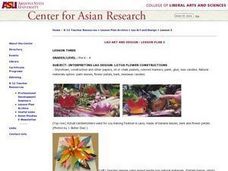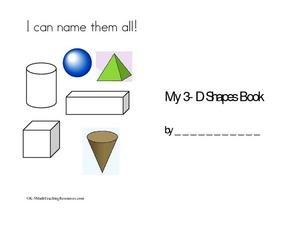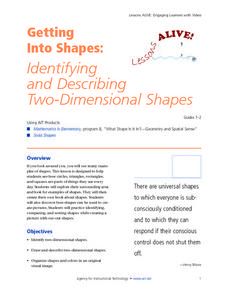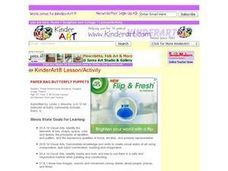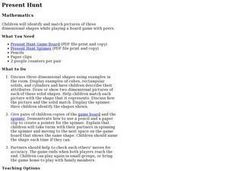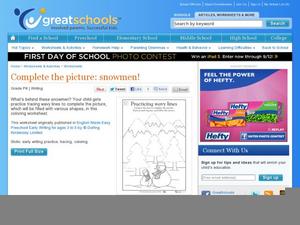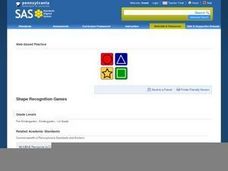Curated OER
Name the 3 Dimensional Shapes of the Objects
Here are six solid figures for learners to identify. The names are listed along the left side and the shapes pictured on the right. Each shape is shown as a familiar object instead of just a drawing. Figures include a cylinder,...
Curated OER
Which One Could Make This Shape?
Explore two and three-dimensional shapes. Learners first examine three 2-D shapes and determine which of three 3-D figures could have made that shape. The wording here is a bit confusing; make sure your kids understand what it is...
MENSA Education & Research Foundation
Shapes - Kindergarten
Extend scholars' learning experience with a unit consisting of five shape lesson plans, an extension activity, assessment, and rubric. Begin by reading a story about shapes, then conduct an overview and assign pupils' their first...
Curated OER
Circles 1, 2, 3, 4
Here is a way to help your charges identify circles and spheres. In this shapes geometry and technology lesson plan, students identify and draw circles and explain the related attributes. They recognize circles and spheres while...
Curated OER
Branding Circles, Squares, Rectangles, Triangles
Compare and classify 2-D shapes! Kindergarteners inspect the attributes of plane shapes and examine shapes in everyday life. They label the circles, squares, rectangles, and triangles they find. This is the website where you can find the...
Curated OER
Draw the Shapes Positions as Directed
Following directions is an extremely important skill to master. Learners follow the directions in each sentence. Then they draw specific shapes in specific positions in the provided boxes. A good review resource.
Curated OER
Circles to Spheres
Students investigate circles and spheres. In this space shapes lesson, students compare and contrast two-dimensional and three-dimensional shapes. Students investigate the relationship between plane and space shapes.
Curated OER
Lao Design: Lotus Flower Constructions
Students create lotus flowers in 3-D designs applying Lao art techniques. Following a teacher demonstration, they assemble their own lotus flower candleholders and the teacher arranges a group flotation in a body of water. Students...
Curated OER
What Shapes Can You See?
Students investigate shapes in art. In this visual arts lesson, students examine the ancient Panamanian "Plaque" and identify the geometric shapes in the art piece. Students combine basic shapes to make an artistic picture of their own.
Curated OER
Explore Three-Dimensional Shapes
Students are assigned to shape groups and explore three-dimensional shapes. They review math skills and two-dimensional shapes.
Curated OER
Shape Hunt
Young scholars explore two-dimensional and solid shapes. In this shapes and patterns geometry lesson, students work with a partner to create identifiable objects using tangrams. Young scholars describe the attributes of their shape and...
Curated OER
Shape Tool
Students explore various polygons and examine how shapes can be manipulated in a variety of ways. In this shape tool lesson, students identify geometric shapes in two dimensions. Students identify and draw one line of symmetry in a...
Curated OER
Recognize and Draw Shapes
What type of shape is this? Learners practice identifying shape attributes as they name a parallelogram and an oval and count the sides of a cube and a triangle. There are multiple-choice answers for the shape-name questions, so...
Curated OER
I Can Name Them All!
Six 3-D shapes are featured in this figure-recognition book template. As they create a "My 3-D Shapes Book," young scholars place shapes on the appropriate pages, which already have text indicating the shape and its color. Although it is...
Curated OER
Getting Into Shapes: Identifying and Describing Two-Dimensional Shapes
Young scholars examine their classroom to find examples of various types of shapes. After identifying and describing the various shapes, they draw as many as they can on a piece of paper. They organize them into an image based on their...
Curated OER
Paper Bag Butterfly Puppets
Whether you're using it to tell stories, explore the letter b, or during a life science lesson plan, these butterfly puppets will be a hit. Youngsters use crayons, tissue paper, and paper bags to create butterfly puppets.
Curated OER
Shaded Bottles
Learners draw, and then paint three-dimensional bottles to practice shading which shows shape and perspective. The step-by-step process for creating dimensional still life art is outlined, which makes teaching art an attainable task. Oil...
Curated OER
Present Hunt
Students identify and match pictures of three dimensional shapes while playing a board game with peers. They take turns with their partners in spinning the spinner and moving to the next space on the game board that shows the same shape.
Curated OER
Complete the Picture: Snowmen!
Finish the winter wonderland with your preschoolers. They trace pine trees and the tops of mountains to complete the snowy drawing. Have them color their paper and display the drawings during a winter unit!
Noyce Foundation
Cubism
If cubism were a religion, would you follow it? Lower-level tasks focus primarily on counting the number cubes in a structure and relating the number to surface area. As learners progress to higher-level tasks, isometric drawings and...
Curated OER
Drawing Emotions
Students examine how artists have expressed emotion thru use of line, color and shapes. They communicate a variety of emotions using line, shape and values to create form.
Curated OER
Shape Recognition Games
Students explore shapes. In this math lesson, students identify basic geometric shapes. Students complete activities in which they identify shapes, symbols and letters. Students draw geometric shapes.
Curated OER
Recognize and Draw Shapes Word Problems
It's time for a geometry warm up! Geometry scholars examine a figure to determine its name from a list of four choices. The figure, a trapezoid, is large enough for the whole class to see if you were to project this. An explanation at...
Curated OER
Recognize Triangles
In this shapes worksheet, learners are asked to "colour" all of the triangles they find on the page. There are 10 shapes on the page and 4 are triangles. The second page contains suggestions for teachers on activities with 2-D shapes.







